|
|
|
Sort Order |
|
|
|
Items / Page
|
|
|
|
|
|
|
| Srl | Item |
| 1 |
ID:
189245


|
|
|
|
|
| Summary/Abstract |
This article examines the new prominence accorded to the “Indo-Pacific” (IP) concept in the strategic narratives championed by the US and its closest allies, (Japan and Australia), and then juxtaposes this with the responses of other key regional powers. To this purpose, Part I distils a concise conceptual model encompassing three interlocking facets – mental maps, political/ideological drivers, and visions of regional order – designed to structure the following empirical analyses. Part II then accesses this model to reveal how these facets are reflected in the discursive and policy-making practices of the US and its close allies, as embodied in their (combined) regional strategies. Next, Part III considers how a cross-section of major states in the region – India, South Korea, and China - have responded to this enterprise, to determine the degree to which they have adopted, accommodated or opposed the IP concept, or otherwise propose national alternatives to the US-centered project. It concludes that the IP concept is not simply an objective geopolitical descriptor, but rather a controversial and contested discursive field, subject to multiple interpretations. Such a polarizing concept will likely contribute to further sharpening of strategic mistrust and geopolitical competition amongst the region’s major powers.
|
|
|
|
|
|
|
|
|
|
|
|
|
|
|
|
| 2 |
ID:
175513
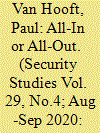

|
|
|
|
|
| Summary/Abstract |
Critics of the expansive US grand strategy of deep engagement argue that the United States should pursue strategies of retrenchment to avoid provoking conflicts with major powers and allied freeriding. Retrenchers believe the United States can rely on the inherent security its insularity and distance from other major powers provides and delay its possible interventions until strictly necessary. Should a hegemonic power emerge in Eurasia, its command of the maritime commons will allow US reentry into the region. This paper argues that such strategies are not likely to succeed for the US in Asia, but neither is the US likely to avoid escalation with China if it continues deep engagement. The balance of interests between the United States and its allies and adversaries is inherently asymmetric because the United States is a distant, offshore power. This in turn makes it difficult to convince adversaries and allies that it is willing to spend blood and treasure and to convince the domestic audience of the need to do so. Entanglement abroad and overselling at home are thus endemic in the US grand strategy. The history of US engagement in Cold War Europe illustrates how US commitments swung between the extremes of the pendulum. This paper shows how this dynamic applies to the Sino-American competition in the Western Pacific, where China seeks to raise the costs for the United States, and the United States seeks to maintain military-technological superiority to maintain access. If the United States is committed to upholding the balance of power, it must be willing to court disaster and treat China as an existential threat. In Asia, the former thus faces a stark choice between dangerous escalation and retreat.
|
|
|
|
|
|
|
|
|
|
|
|
|
|
|
|
| 3 |
ID:
114966
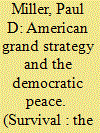

|
|
|
|
|
| Publication |
2012.
|
| Summary/Abstract |
It is commonplace to lament the United States' lack of a coherent grand strategy. Cold War historian John Lewis Gaddis argued in 2009 that the United States suffered from a 'grand strategic deficit' that went back two decades to the fall of the Soviet Union. Stephen Walt, a prominent International Relations professor at Harvard, blogged in 2010 that 'the United States tries to do more than it should, finds it much harder to set clear priorities, and tends to miss opportunities to "pass the buck" to others', the solution for which was 'a more lively public debate on fundamental issues of grand strategy'. Fareed Zakaria, then editor of Newsweek International, wrote in 2008 an article titled simply: 'Wanted: A New US Grand Strategy'.
|
|
|
|
|
|
|
|
|
|
|
|
|
|
|
|
| 4 |
ID:
108951
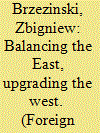

|
|
|
| 5 |
ID:
138724
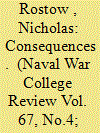

|
|
|
|
|
| Summary/Abstract |
This article examines possible consequences of U.S. and NATO withdrawal from Afghanistan, Russian annexation of Crimea and claims to territory inhabited by ethnic Russian citizens of other countries, and Chinese claims to control large adjacent areas of the Pacific Ocean. Fundamental principles of world public order are at risk or directly challenged in Afghanistan, Ukraine, and the western Pacific. They are not unique locations in this respect, but this article is not a review of all aspects of U.S. diplomacy and policy or of international relations since the end of the Cold War.
|
|
|
|
|
|
|
|
|
|
|
|
|
|
|
|
| 6 |
ID:
157852


|
|
|
|
|
| Summary/Abstract |
Does withdrawing forward-deployed US troops increase instability? This question is at the heart of current grand strategy debates, yet endogeneity issues make this very difficult to answer. Put simply, stability may cause the United States to withdraw forces and lead one to incorrectly infer that withdrawals do not lead to greater instability. We suggest a research design to help alleviate this endogeneity problem. By utilizing exogenous crises that cause US troops to redeploy out of South Korea, we are able to estimate the causal effect of a withdrawal of US troops on the probability of instability. We examine several exogenous crises after the end of the Korean War that force US policymakers to rapidly redeploy US forces out of South Korea. We then examine the rate of conflict between South Korea and North Korea, and the United States and North Korea. We find that US troop withdrawals do not cause greater conflict, but withdrawals are at times associated with other behaviors, such as conventional arming, nuclear proliferation, and diplomatic initiatives that could affect the future likelihood of war.
|
|
|
|
|
|
|
|
|
|
|
|
|
|
|
|
| 7 |
ID:
117446


|
|
|
|
|
| Publication |
2012.
|
| Summary/Abstract |
After sixty-five years of pursuing a grand strategy of global leadership-nearly a third of which transpired without a peer great power rival-has the time come for the United States to switch to a strategy of retrenchment? According to most security studies scholars who write on the future of U.S. grand strategy, the answer is an unambiguous yes: they argue that the United States should curtail or eliminate its overseas military presence, abolish or dramatically reduce its global security commitments, and minimize or eschew efforts to foster and lead the liberal institutional order. Thus far, the arguments for retrenchment have gone largely unanswered by international relations scholars. An evaluation of these arguments requires a systematic analysis that directly assesses the core claim of retrenchment advocates that the current "deep engagement" grand strategy is not in the national interests of the United States. This analysis shows that advocates of retrenchment radically overestimate the costs of deep engagement and underestimate its benefits. We conclude that the fundamental choice to retain a grand strategy of deep engagement after the Cold War is just what the preponderance of international relations scholarship would expect a rational, self-interested leading power in America's position to do.
|
|
|
|
|
|
|
|
|
|
|
|
|
|
|
|
| 8 |
ID:
131388
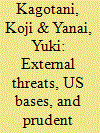

|
|
|
|
|
| Publication |
2014.
|
| Summary/Abstract |
A number of US overseas bases were deployed around the world to protect allies and maintain regional peace. Some bases have been stationed in the partner countries for the long term, whereas others were withdrawn from their partners' territories in the face of strong local opposition. Understanding local support for US overseas bases is indispensable for managing alliance politics and pursuing US grand strategy. This article addresses the 1972-2006 Okinawa gubernatorial elections where the US base issue had been chronically politicized and locals supported pro-base candidates six out of ten times contrary to their anti-base preferences. This article addresses external threats as a determinant of vote choice. We analyze the gubernatorial elections as the opportunities for Okinawans to convey their support for or opposition to the current national security policy since US bases in Okinawa are critical to Japan's security. We find that external threats do encourage Okinawans to support pro-base candidates, but the effect of perceived security-related risks is moderate. Moreover, physical and psychological costs such as airplane crashes, environmental and noise pollution, and rape incidents have larger influence on the election outcomes rather than material benefits such as the fiscal transfers and base-related subsidies, which is contrary to the conventional view.
|
|
|
|
|
|
|
|
|
|
|
|
|
|
|
|
| 9 |
ID:
186992
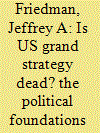

|
|
|
|
|
| Summary/Abstract |
International Relations scholars frequently warn that the American political system has become too fractured to sustain a coherent grand strategy. This perception generally rests on two premises: that President Donald Trump led an unprecedented assault on established principles of US foreign policy, and that Democrats and Republicans have become so polarized that they can no longer agree on a common vision for global leadership. By contrast, this article argues that the grand strategy of deep engagement retains robust bipartisan support. Even though President Trump rejected more expansive conceptions of liberal internationalism, his behaviour was largely consistent with deep engagement's principles. Moreover, when Trump departed from deep engagement—as with questioning the US commitment to NATO—his actions did not reflect voters' policy preferences. In fact, polling data indicate that public support for deep engagement is at least as strong today as it has been at any other point since the end of the Cold War. Altogether, the article thus demonstrates that the grand strategy of deep engagement is less embattled, and more politically viable, than the conventional wisdom suggests.
|
|
|
|
|
|
|
|
|
|
|
|
|
|
|
|
| 10 |
ID:
167696
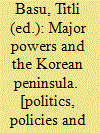

|
|
|
|
|
| Publication |
New Delhi, KW Publishers Pvt Ltd, 2019.
|
| Description |
xvii, 371p.hbk
|
| Series |
East Asia Strategic Review
|
| Standard Number |
9789389137156
|
|
|
|
|
|
|
|
|
|
|
|
Copies: C:2/I:0,R:0,Q:0
Circulation
| Accession# | Call# | Current Location | Status | Policy | Location |
| 059702 | 320.519/BAS 059702 | Main | On Shelf | General | |
| 059703 | 320.519/BAS 059703 | Main | On Shelf | General | |
|
|
|
|
| 11 |
ID:
175515


|
|
|
|
|
| Summary/Abstract |
Perhaps the most significant foreign policy decision facing the United States is whether to retain its global security commitments or retrench from key regions. Although primacists are optimistic that the United States will remain ahead of its rivals, restrainers are more pessimistic about its prospects. I argue instead that this debate overlooks the importance of geopolitical orientation. Maritime powers such as the United States are frequently in competition with multiple adversaries at once. This introduces an interdependent commitment problem that makes primacy difficult to sustain and dangerous to enforce, especially given the propensity to employ similar military approaches against different opponents. At the same time, maritime powers experiencing decline can respond in ways that fall short of retrenchment. This is mainly because their naval forces provide many options for upholding their obligations. Applied to the United States, these arguments suggest Washington might choose to diversify its defense strategy rather than abandon its commitments. In the Middle East, for example, it could rely on punishment via naval blockade rather than denial against Iran, not only because the former strategy would require fewer high-value military assets than the latter but also because it might allow the United States to avoid the types of clashes that would undermine its position relative to higher-priority threats.
|
|
|
|
|
|
|
|
|
|
|
|
|
|
|
|
| 12 |
ID:
174618


|
|
|
|
|
| Summary/Abstract |
Amidst all the criticisms of the Trump foreign policy, one aspect that has received substantial praise has been the emphasis on great power competition. “After being dismissed as a phenomenon of an earlier century, great power competition returned,” the 2017 National Security Strategy declared. “Long-term strategic competitions with China and Russia are the principal priorities for the [Defense] Department,” the 2018 National Defense Strategy affirmed.
|
|
|
|
|
|
|
|
|
|
|
|
|
|
|
|
| 13 |
ID:
138598
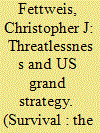

|
|
|
|
|
| Summary/Abstract |
As the Soviet Union was in the process of collapsing, Georgi Arbatov sent a letter to the New York Times that contained a warning for the United States. Arbatov, who was one of the Kremlin’s leading ‘Amerikanists’, wrote that the Soviets were unleashing a ‘secret weapon’, one ‘that will work almost regardless of the American response’. It was not the stuff of Cold War
nightmares, some sort of last-minute deus ex machina from the Academy of Sciences that would rescue the Soviet Union from oblivion. No, in this instance, the weapon was psychological and unequivocal: the Kremlin was about to deprive America of the Enemy.
|
|
|
|
|
|
|
|
|
|
|
|
|
|
|
|
| 14 |
ID:
111788


|
|
|
| 15 |
ID:
179802
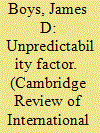

|
|
|
|
|
| Summary/Abstract |
Five decades before Donald Trump sought to make a virtue out of his unpredictable approach to policy, Richard Nixon adopted a similar stance in regard to foreign affairs that became known as The Madman Theory. The Nixon-Trump comparison in regard to foreign policy and their embrace of a high-risk approach to international negotiations once in office, follows striking parallels between the two men’s campaign pledges in 1968 and 2016. This paper examines the Madman Theory to consider its implementation by the Nixon administration and its subsequent adoption by the Trump White House as both leaders sought to rationalize their unpredictable approach to international flashpoints. Through a consideration of speeches, statements, transcripts and tweets it is possible to discern the manner in which both presidents embraced this approach to international relations, and the extent to which it served their interests as President of the United States.
|
|
|
|
|
|
|
|
|
|
|
|
|
|
|
|
|
|
|
|
|